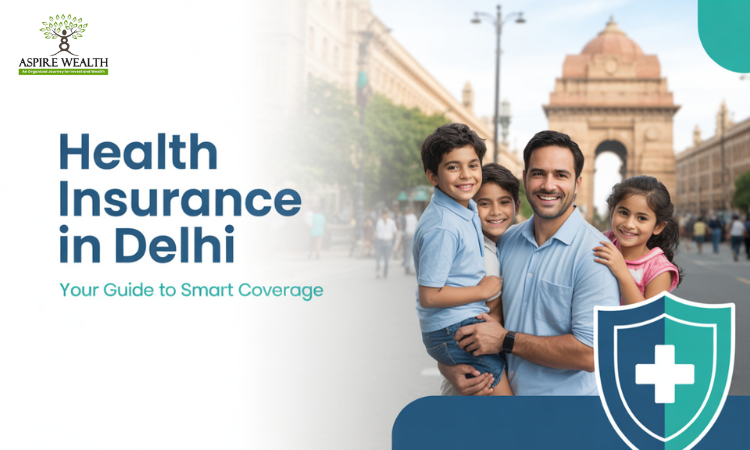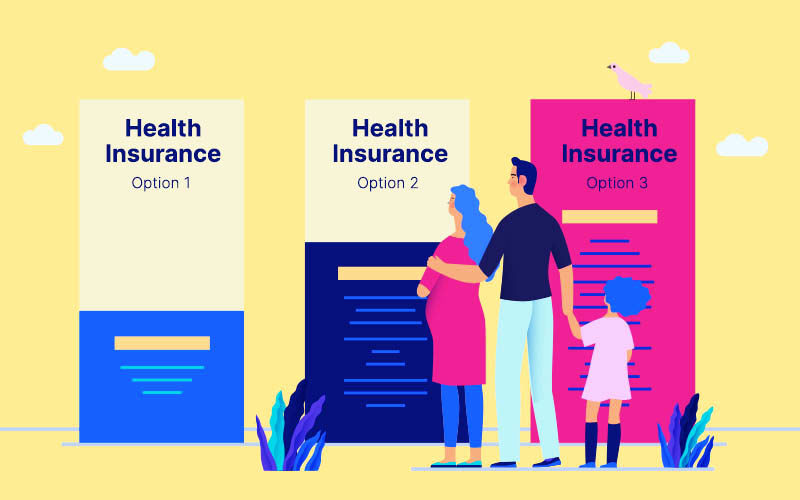Health Insurance in Delhi: What First-Time Buyers Must Know

Strong 8k brings an ultra-HD IPTV experience to your living room and your pocket.
Health insurance is your financial safety net against unexpected medical costs. For first-time buyers in Delhi, understanding how it works is key. Experts note that insurance provides crucial protection during serious illness. In India, about 63% of healthcare expenses are still paid out-of-pocket, so having a policy can shield your savings. Health insurance in Delhi can provide a safety net when medical bills threaten to break the bank. In this friendly guide, we’ll cover the basics of health insurance, highlight Delhi’s common health risks, outline the types of plans available, and share tips on choosing wisely (plus mistakes to avoid and where to find trusted options).
✍️ Healthcare inflation is rising at double-digit rates. Learn why a health insurance plan is the smartest way to safeguard your financial future against medical emergencies and chronic illnesses.
Health insurance works by shifting the cost of major treatments from you to an insurer. You pay a regular premium, and in return the company covers hospitalisation, surgery, tests, medications, and other defined costs. This means a serious illness won’t drain your savings. In Delhi’s private hospitals, even a short hospital stay can be expensive, so insurance offers peace of mind. In fact, without coverage, people can fall into debt or bankruptcy from high medical bills. A good plan ensures routine check-ups, ambulance rides, and emergency care all get covered (subject to policy limits). Ultimately, this financial protection lets you focus on recovery, not rent and life savings.
Common Health Risks in Delhi
Delhi faces some unique health hazards. One of the biggest is air pollution. Poor air quality in the capital has led to a rise in respiratory and cardiac issues among residents. Cases of asthma, bronchitis and other lung diseases spike on smoggy days, and even heart attacks and strokes are more common. For example, doctors report many more patients with chronic coughs and breathing trouble whenever the AQI soars. Children and the elderly are especially vulnerable. Another seasonal risk is monsoon-related illnesses. Each rainy season brings flooding and waterlogging, which boost waterborne and vector diseases. Stagnant water spreads cholera, typhoid and hepatitis A, while increased mosquitoes cause more dengue and malaria cases. A surge in fevers and stomach infections is often seen after heavy rains.
Besides pollution and waterborne diseases, Delhi residents also face common chronic and lifestyle illnesses. High stress, sedentary work, and diet habits contribute to hypertension, diabetes and heart disease. In fact, health data show that circulatory diseases (like heart disease) and cancers account for a large share of deaths in Delhi. Regular screenings and treatment for these conditions can be expensive. A comprehensive health plan can ease the cost of managing such chronic issues, covering everything from diagnostic tests to long hospital stays when needed.
Types of Health Insurance Policies
First-time buyers should know that different plans suit different needs. Here are the main types of health insurance policies available in Delhi:
- Individual Plans: Cover only one person. Suitable if you only need insurance for yourself (or for each family member separately).
- Family Floater Plans: Cover the whole family under one sum insured. All insured members share the total coverage amount. This can be more economical for parents and children.
- Senior Citizen Plans: Tailored for older adults (often age 60+), with benefits like higher coverage or no-exclusions for some conditions. Premiums are higher, but coverage is crucial as health risks grow with age.
- Group (Employer) Plans: Offered by many companies to cover employees. These can be limited (age caps or fixed coverage) and usually end when you leave the job, so they’re not a complete substitute for personal cover.
- Government Schemes: For low-income families, the government’s Ayushman Bharat (PM-JAY) provides free cover up to ₹5 lakhs per family per year. If you qualify, this can cover most major treatments at empanelled hospitals. (Keep in mind it’s only for eligible poor and vulnerable families.)
- Top-Up Plans: These are extra coverage that kicks in after your base policy limit is exhausted. Useful if you want very high protection without paying a huge premium on your main plan.
- Specialized Riders/Add-Ons: You can sometimes add coverage for things like maternity, critical illness or dental, but these raise your premium. Choose add-ons only if you need them.
How to Choose the Right Policy (Step-by-Step)
Selecting a health plan may seem complex, but you can break it into clear steps:
- Assess Your Health and Coverage Needs: Decide who will be covered (you alone, or family floater covering spouse and kids). Consider ages and health conditions. Estimate a suitable sum insured – a higher amount for families or older people. Living in an expensive metro city like Delhi means hospital bills can be much higher, so experts advise choosing a larger sum insured to match local costs.
- Compare Coverages: Look at what each plan covers. Important features to check include: pre- and post-hospitalisation expenses (consultations, diagnostics and medicines before/after a stay); day-care procedures (treatments not requiring 24-hour admission); and coverage limits for treatments like dialysis or chemotherapy. Ensure newborn care, vaccination benefits, and ambulance expenses are included if you need them. If you plan on having kids soon, look for maternity benefits or riders. Make sure the insurer has a wide hospital network in Delhi, so you can use cashless facilities at reputed local hospitals.
- Understand Waiting Periods and Exclusions: Every plan has a waiting period (usually 1-3 years) before you can claim for pre-existing conditions like diabetes or hypertension. Find a policy with the shortest waiting period if you have existing health issues. Read the fine print for exclusions (what’s not covered), co-payment clauses, and caps. For example, check if there’s a co-pay (you pay a % of each claim) or limits on room rent. Avoid policies with high co-pays or strict sub-limits if possible. Compare carefully: “It is in your best interest to…choose a plan with the lowest waiting period” for common conditions.
- Compare Premiums and Renewability: Once the coverages align with your needs, compare costs. Lower premiums are attractive, but beware of plans that cut costs with limitations (like large co-pays or fewer covered treatments). Look at long-term renewal rules – top insurers now offer lifetime renewability so you can keep the same policy as you age. Also check if the premium jumps a lot at renewal or with each year of age.
- Consider Insurer Reliability: Check the claim settlement ratio and customer reviews of the insurance companies you’re comparing. A high settlement ratio means the company pays a large percentage of claims. Reliable, well-known insurers (both public and private sector) usually handle claims smoothly. It’s worth using official portals or aggregator websites to get quotes from multiple providers. Some fintech apps and insurance websites let you compare plans side by side, saving time. Finally, when you’re ready, apply online for quick policy issuance (many insurers offer instant coverage or minimal paperwork these days).
Common Mistakes First-Time Buyers Should Avoid
- Under insuring: Don’t pick a very low sum insured just to get a cheap premium. If coverage is too low, you may pay the rest of a claim from your pocket. In Delhi, even a single surgery can exceed ₹3–4 lakh.
- Ignoring Waiting Periods: Many newbies are caught off-guard by the waiting period for pre-existing conditions. If you have any health issues, don’t assume they’ll be covered immediately.
- Overlooking Exclusions and Sub-Limits: Always read the policy brochure (or ask an expert) about what’s excluded (e.g., some surgeries, cosmetic treatments, or dental care) and any sub-limits on room rent or ICU charges.
- Choosing by Price Alone: The cheapest plan may have copayments or restricted coverage. Balance cost with benefits.
- Not Comparing Multiple Options: Don’t settle on the first plan you see. Use online comparison tools or talk to a broker/agent to review several plans.
- Delaying Purchase: It’s tempting to postpone, especially when you’re young, but premiums rise with age and conditions can appear unexpectedly. Buying insurance early locks in lower rates.
- Not Updating Your Plan: After marriage or childbirth, update your policy to add your spouse or child. A common mistake is forgetting to inform the insurer of new dependents.
Finding Trusted Providers and Platforms
When you’re ready to shop, look for established insurers and reliable platforms:
- Government and Public Insurers: India’s national insurers (often public sector companies) have wide hospital networks and regulated plans. They often participate in government schemes like PM-JAY.
- Private Insurers: Many private insurers offer comprehensive plans with customer-friendly features (24/7 helplines, quick claim processing). You don’t need to pick a brand now, but ensure any company you consider is IRDAI-approved and well-reviewed.
- Digital Aggregators: Online insurance marketplaces (without naming brands) let you compare quotes from multiple companies at once. They simplify filtering plans by budget, coverage, and features.
- Direct Websites and Apps: You can also buy directly on an insurer’s website or mobile app. These are often paperless and instant. Just double-check that the site/app belongs to the official insurer (look for IRDAI logo or proper domain).
No matter which route you use, prioritize insurers with a strong claim support system and many in-network hospitals in Delhi. Having easy access to a cashless hospital is a key advantage of a good plan.
Also Read: Why Health Insurance Is A Must In 2025
Conclusion
Choosing your first health policy in Delhi might seem daunting, but taking it step by step makes it manageable. Remember that a suitable plan will safeguard your family’s health and finances. Delhi’s unique environment makes having coverage especially important. By comparing options thoughtfully and buying before it’s urgently needed, you’re setting yourself up for peace of mind. Even on a tight budget, there are ways to find low cost health insurance in Delhi without sacrificing essential coverage. Entry-level plans and government-supported schemes can give you decent protection at a reasonable premium. With careful research and the tips above, you can secure affordable, adequate health insurance and rest easier knowing you’re prepared for Delhi’s health challenges.
Note: IndiBlogHub features both user-submitted and editorial content. We do not verify third-party contributions. Read our Disclaimer and Privacy Policyfor details.







